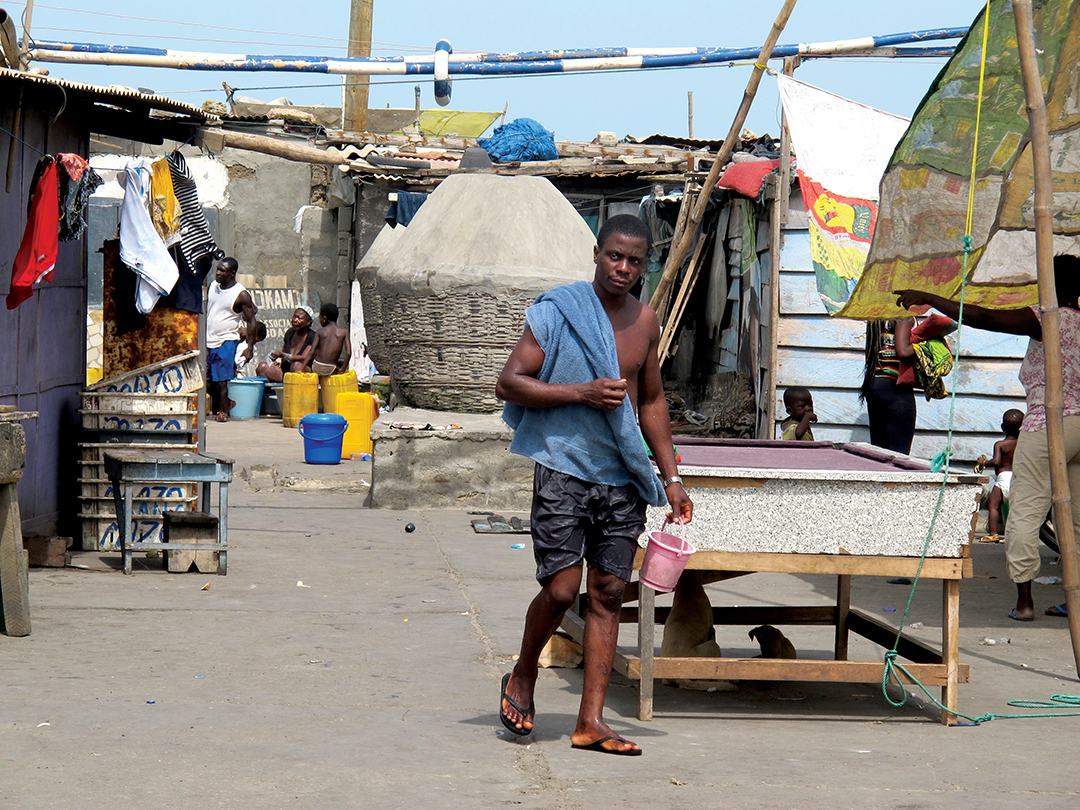Countermessaging that Springs from the Grass Roots Can Be an Effective Tool Against Radicalization
War and civil strife have surrounded Ghana for years. Neighbor Côte d’Ivoire has fought two bloody civil wars since 2002. Liberia has fought two civil wars since 1989, and Sierra Leone was at war in the same period.
More recently, northern Nigeria has been plagued by the Boko Haram insurgency that has spilled into Cameroon, Chad and Niger. Mali and Burkina Faso also have experienced coups and upheaval.
![Mutaru Mumuni Muqthar, executive director of the West Africa Centre for Counter-Extremism (WACCE), left, and staff member Abdul Hakeem Badawi at the WACCE office in Accra, Ghana [ADF STAFF]](https://adf-magazine.com/wp-content/uploads/2016/03/Mutaru-and-Hakeem.jpg)
“News about a 25-year-old graduate of the Kwame Nkrumah University of Science and Technology (KNUST), Nazir Nortei Alema, purportedly joining the terrorist group recently spread like wild fire and it has attracted both national and international concerns. The National Security as a result, has reportedly commenced investigations into activities of the would-be terrorists and the Ghana Police Service is deeply involved.”
The incident raises questions of just how pervasive ISIS recruitment efforts are in Ghana, and how peaceful societies can effectively counter the narratives of violent extremists.
GRASS-ROOTS GROUP TAKES ACTION
Even as Ghana was reeling from the news of Alema’s decision to join ISIS, a fledgling group was continuing its work to counter violent extremist messaging. The Accra-based West Africa Centre for Counter-Extremism (WACCE), founded in November 2014, seeks to respond to the growing influence among West Africans of groups such as ISIS, Boko Haram, and the Movement for Oneness and Jihad in West Africa.
“I have always been interested in security, and after coming close to the verge of radicalization as a teenager, I realized that this is a threat that could be affecting many other individuals,” Mutaru Mumuni Muqthar, founder and executive director of WACCE, told ADF.
Since its inception, WACCE has marshaled the work and talents of up to seven people, mostly volunteers, to hold half a dozen community engagements. WACCE personnel have expertise in information communications technology, management, security and terrorism. Two program officers, an administrative assistant, and an ad-hoc team of three people who help design projects, proposals and events work alongside Muqthar. There are plans to recruit five permanent employees over the next year, and WACCE hopes eventually to open three additional offices in neighboring West African countries over the next five years.
“As a new organization, it is not easy to organize an engagement because we have critical logistical constraints,” Muqthar said. “At the moment, our activities are funded by ourselves, small contributions from friends and the volunteers who choose to work with us.”
![Abose-Okai Road in Accra, Ghana, bustles with activity. ISIS made headlines with the recruitment of two Ghanaians in August 2015. [ADF STAFF]](https://adf-magazine.com/wp-content/uploads/2016/03/Ghana-2.jpg)
[ADF STAFF]
“We emphasize counternarratives,” Muqthar said. “This is because we consider our audience as powerful agents in terms of altering radicalizing narratives and the deconstruction of messages that influence the individual’s propensity to endure in violence and extremist ideals. They can challenge the terror-inducing narratives of radicalizers and put in its stead positive alternatives. Such countermessages are often more powerful and effective when they come from community leaders and members themselves rather than organizations or even the state.”
BATTLING ISIS’ TWISTED VERSION OF ISLAM
Ghanaian National Security Coordinator Yaw Donkor told state media in August 2015 that Alema and one other person who has not been identified likely traveled through Burkina Faso or Nigeria on their way to an ISIS training camp in Niger before continuing on to Turkey or Syria.
Donkor said that as a result of Alema’s case, Ghanaian authorities are investigating possible links between the nation’s universities and ISIS. But he also said there have been only a handful of cases in Ghana and that there is no reason to fear that widespread radicalization is going on.
Even so, ISIS and other extremist groups often draw in youths with rhetoric that exploits the commonly held notion that governments are corrupt and that radicalization is required of devout Muslims. Alema, who earned a degree in geography and rural development, was no exception. He is thought to have left for ISIS training grounds on August 2, 2015, soon after he completed mandatory national service in Ghana, StarAfrica.com reported.
An unidentified friend of Alema’s told Accra-based Joy FM in August 2015 that Alema tried to persuade him to join ISIS, too. “From our interaction, I realized that he had many things going wrong with his understanding of the Quran,” the friend said, according to StarFMOnline.com. “He was always quoting the Quran out of context, and you could realize that he has been massively brainwashed by the group.”
Once he left, Alema contacted his family in Ghana through the social media app called WhatsApp on August 16, 2015. It was then that he mentioned his negative views of the government.
“Pray for me, for I will never forget you in my prayer, and it’s my hope and prayer that we meet again, if not in this world then in Jannah (paradise). I love you all. May Allah grant us understanding and guide us all to the straight path. Asalaamu alaikum,” he wrote, according to StarFMOnline.com.
“I told you a lie to please my Allah. The deception was to go do some research work in faraway Prestea [a town in southwest Ghana] while the main idea was to move far away from you all to the Islamic State. I know it might sound kind of crazy for you, but your son really had to take this bold step to get out of the corrupt system of Ghana which has democracy first on its list.”
CRAFTING NARRATIVES FROM THE BOTTOM UP
Experience shows that government voices do not always carry the most credibility when countering extremist narratives. Muqthar of WACCE said despite generally supportive comments from the communities with whom his group engages, some remain skeptical. “There have been many others who question us, asking who we work for or work with — the state or a religious group?” he said. “Others are dismissive of the existence of any vulnerability for radical extremism and reduce the discourse to anti-West sentiments — propaganda we are so familiar with.”

ADF STAFF
Muqthar and some of his colleagues are Muslims, which gives them added credibility when countering extremist narratives in Ghana, where nearly a fifth of the nation’s 27 million people are Muslim. WACCE audiences are predominantly, but not exclusively, Muslim. Outreach programs are aimed at helping people understand “the character of extremism and the underpinnings of radicalization,” he said.
Although WACCE works well with various government and civil-society organizations, Muqthar said, countermessages often are more powerful and effective when they come from community leaders and civilians rather than organizations or the state. WACCE contacts imams in local mosques to reach out to the local community. “They have been very supportive and wonderfully helpful to our cause,” he said. “We see them as key partners and agents for our cause, and we intend to engage them more and to make them a central part of our work.”
THE POWER OF NARRATIVES
In June 2014, Hedayah, the International Center of Excellence for Countering Violent Extremism, and the International Centre for Counter-Terrorism — The Hague (ICCT) organized a round-table meeting on “Developing Effective Counter-Narrative Frameworks for Countering Violent Extremism.”
Participants discussed a range of potential counternarratives, according to a report from the meeting:
- Positive/alternative narratives: These focus on creating “proactive, positive and alternative narratives.”
- Strategic counternarratives: These can be used by governments and large organizations, but they may not be as effective in reaching people already supporting violent extremist organizations.
- Ethical counternarratives: These show the lack of morality in violent action and may be useful for messengers who have moral influence on the audience.
- Ideological and religious counternarratives: This approach will be most useful for messengers who have religious authority over the audience, such as imams, Islamic scholars and other religious figures.
- Tactical counternarratives: These teach that violence is less effective than more peaceful methods in the long run. Government and community organizations that use these counternarratives also should provide ideas for how audiences can achieve goals without violence.
- Humor and sarcasm: This approach may help delegitimize violent extremist narratives, but it may not reach the target audience, instead only reinforcing “the absurdity of terrorism to the general public,” which already doesn’t support extremist organizations.
Meeting participants recommended that the private sector work with policymakers and the community to create effective counternarratives.
“Participants generally agreed that credible voices at the grassroots level are needed to counter the everyday messaging of violent extremist organizations,” a meeting report said. “Participants also emphasized that face-to-face interactions are still very important, even in a society where Internet access is high.”
Among its multiple layers of suggestions, the report from the Hedayah and ICCT meeting underscores the value of having positive narratives that originate at the community level.
“Attractive alternative narratives can contribute to the prevention of radicalization and recruitment if they are delivered to the target audience by trusted sources,” the report states. “It was agreed that working on the community level was key; community leaders that are informed of potential radicalization and recruitment to violent extremism in their own communities are better partners in efforts to counter violent extremism in those communities.”

